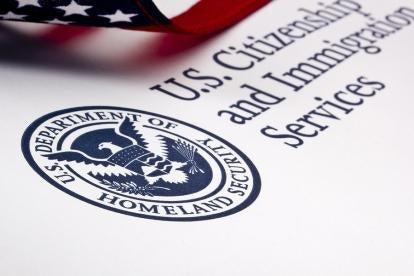On September 5, 2017, Attorney General Jeff Sessions announced that the Trump administration would be eliminating the Deferred Action for Childhood Arrivals program (commonly known as “DACA”). The DACA program allowed for certain aliens who came to the United States as children to obtain work permits and a temporary reprieve from removal for renewable periods of two (2) years at a time. The announcement laid out the specifics of the administration’s planned wind-down of the program, including:
-
As of September 5, 2017 no new initial DACA applications will be processed or adjudicated by U.S. Citizenship and Immigration Services (USCIS).
-
USCIS will receive and adjudicate certain DACA renewal applications up until October 5, 2017. In order to qualify to apply for a DACA renewal, however, one’s current DACA status must expire no later than March 5, 2018 (the end of the six month wind-down period for the program). USCIS will reject all DACA renewal applications that do not fit these narrow parameters.
Furthermore, the Department of Homeland Security (DHS) has indicated that all individuals who currently have two-year work permits based on DACA will be allowed continued employment authorization and protection from removal until the expiration date listed on their employment authorization document. Also, DHS has indicated that there will be no targeted enforcement action against DACA recipients for at least six (6) months while the issue is debated in Congress.
DACA recipients with advance parole documents who have not yet left the United States should seriously consider the risks and potential consequences of departing and attempting to reenter at this point in time
DHS also indicated that applications for advance parole based on DACA will no longer be adjudicated by USCIS and no such applications after September 5, 2017 will be approved. Advance parole is a mechanism whereby an applicant applies for advance permission to reenter the United States after a period of international travel. This program was used by DACA recipients in order to obtain lawful entries to the United States, as many of them had entered the United States without inspection (i.e., not at a proper point-of-entry) and were thereby barred from many types of relief which would have otherwise been available to them.
DHS also indicated that any pending advance parole applications based on DACA will be administratively closed and the fees will be refunded to the applicants. DACA recipients currently outside the United States with otherwise valid advance parole documents will be allowed reentry within the validity period of the document, subject to the discretion of Customs and Border Protection (CBP) agents at points-of-entry. Accordingly, DACA recipients with advance parole documents who have not yet left the United States should seriously consider the risks and potential consequences of departing and attempting to reenter at this point in time.
Options for Life After DACA
There are many options for relief for DACA recipients which should be discussed with a competent immigration attorney, especially during the six (6) month wind-down period for the program. Some options to discuss include:
-
Family-based Adjustment of Status or Consular Processing – It is possible that a DACA recipient could be eligible to apply for permanent residency based on a family relationship, such as marriage, parent-child relationships, or even sibling relationships. Sometimes, a waiver may be required depending on an individual’s particular circumstances, but this can be discussed with competent counsel.
-
Employment-Based Adjustment of Status or Consular Processing – Similar to above, if a DACA recipient is able to find an employer who wants to sponsor him or her for a green card, this may also be a viable option. Again, due to individual circumstances, certain waivers may be required, but employment-based permanent residency may be a good option for certain young professional DACA recipients.
-
Certain Spouses, Children, and Parents of U.S. Citizens or Lawful Permanent Residents (LPR) Who Have Been Subjected to Battery or Extreme Cruelty by the U.S. Citizen or LPR Family Member – The Violence Against Women Act (VAWA) allows battered immigrants to petition for legal status in the United States without relying on abusive U.S. citizen or LPR relatives for sponsorship. More so, irrespective of the act’s name, it also applies to men who have been battered and subject to abuse, and even potentially to all individuals who entered the United States without inspection. Competent counsel can discuss VAWA eligibility with individuals as a route to potential legal status in the United States.
-
Special Immigrant Juvenile (SIJ) Status – SIJ status is a form of humanitarian relief available to certain immigrants under the age of twenty-one (21) who seek the protection of a state juvenile court due to abuse, neglect, or abandonment by at least one alien parent. SIJ is potentially available to all individuals under the age of twenty-one (21)—even those who entered without inspection—so it may be a viable option for an individual whose parents have either abused, neglected, or abandoned them, regardless of whether these actions occurred within or without the United States.
-
Asylum – Asylum relief may be an option for certain individuals who are unwilling or afraid to return to their home country because of a past persecution—or a well-founded fear of future persecution—based upon their race, religion, nationality, political opinion, or membership in a particular social group. These classes of individuals who are eligible for asylum are well-defined by law, so it would be best to discuss any potential asylum claim with a competent attorney experienced in such matters.
-
U and T Visa/Status for Victims of Certain Crimes – Certain individuals may be eligible for U status or T status, both of which may eventually lead to lawful permanent residency. Applicants may be eligible for U status if they have been a victim of a certain crime; suffered substantial physical or mental abuse as a result of having been a victim of such crime(s); and cooperated in the investigation and/or prosecution of the crime(s). T status is reserved for those who have been subjected to a “severe form of trafficking in persons,” and have complied with a “reasonable request” from law enforcement in the investigation and/or prosecution of said trafficking. Determining whether a person has been subject to a crime and/or a “severe form of trafficking” is something that can be done with experienced counsel.
-
E-2 Nonimmigrant Visa/Status – The E-2 nonimmigrant visa category is reserved for those who make a substantial investment in the United States. This investment can take the form of opening a new business, for example, or purchasing an existing one. The E-2 applicant must demonstrate that their presence in the United States is required in order to oversee the operation of their investment, as well as the investment’s viability and chances for overall success. E-2 status is indefinitely renewable, and could potentially lead to a green card if the investment is successful. There may be some issues regarding changing status from DACA to an E-2, but those can be discussed with counsel, if necessary.
Conclusion
DACA recipients may be eligible for a number of different immigration benefits, the most common of which are discussed above. Moreover, immigration law is extremely complicated and constantly changing; therefore, it is imperative that all individuals who currently have DACA reach out to competent and experienced counsel in order to ensure that their status is not jeopardized after the program officially ends in March of 2018.




 />i
/>i

